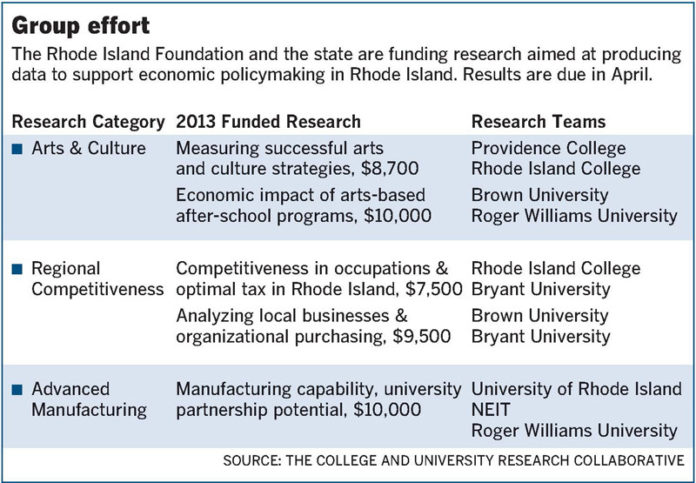One of the economic issues Rhode Island policymakers would like to understand empirically is if the state’s personal income tax is driving high-wage earners out of state.
With that question in mind, two college faculty members are taking a stab at gathering the evidence from a more narrowly focused research project that might lead to an answer. Theirs is one of five such projects launched in a two-year pilot program through a new nonprofit called the College and University Research Collaborative.
Shani D. Carter, Rhode Island College professor of management, said that she and Bryant University professor of economics Jongsung Kim met through a Statehouse gathering organized by the collaborative and successfully applied for a $7,500 grant to study personal tax rates and median earnings data for Rhode Island, Massachusetts and Connecticut.
“The collaborative posed talking points and questions to get us thinking,” said Carter in a recent interview. “The state was interested in taxes and whether it’s making us less competitive regionally. So we’re trying to determine whether personal income tax rates [affect] where high-earning people decide to live.”
The data and evidence that result from that and four other research proposals will be provided first to a panel of four state policy directors in April, and soon thereafter shared broadly across the state, said Amber Caulkins, the collaborative’s program director. Researchers working across 11 colleges and universities in the state will not be making recommendations, but instead are culling evidence that policymakers can use in making decisions, she said.
“Our goal is to be a resource to policy leaders in the state by connecting public policy and academic research in Rhode Island,” Caulkins said.
Making its debut quietly in 2013 with a $100,000 grant from the Rhode Island Foundation and a matching grant from the R.I. Commerce Corporation, the collaborative was launched by the Association of Independent Colleges and Universities of Rhode Island, which is also the fiduciary agent, and the state’s three public institutions of higher education.
“This is the first time all 11 institutions [of higher education] have come together and organized in a way that they could be responsive to the policymakers and consumers in government and use all of the assets of the institutions broadly in the service of the state,” said David M. Dooley, president of the University of Rhode Island and part of the collaborative’s executive committee.
The three broadly defined areas of economic-development research include not only regional competitiveness, but arts and culture and advanced manufacturing.
The policymakers “are looking, over the long term, at topics where maybe there hasn’t been enough data,” said Steinberg, “or [as] an opportunity to test assumptions that may be underlying policy. They are still the ones to set policy and will be getting information they may not have had access to before.”
Egan said the collaborative was founded for several reasons, including an interest in having educators and policymakers work collaboratively as opposed to “in silos;” an “urgent” need for growth in a post-recession economy; and a desire to gain nonpartisan consensus on key economic issues. The Make It Happen initiative held in the fall of 2012 served as a catalyst, Steinberg said.
“The creation of a knowledge network is as important as the research itself,” Egan said. “We’ve been doing this more informally for years. The collaborative formalizes that process and with that, potentially makes it more impactful.”
Dawn King, an assistant visiting professor of environmental studies at Brown University, has joined forces with Joseph A. Ilacqua, an economics professor at Bryant University, to focus on regional competitiveness. The pair is developing evidence to show what local purchasing trends may exist for large Rhode Island institutions and corporations.
The collaborative has partnered with Footnote, an online media company, to put research findings into plain English so the results are accessible to everyone, Caulkins added.
Working on two separate teams, Matthew Gregg, associate professor of economics at Roger Williams University, and Deborah Johnson, professor of art history and women’s studies at Providence College, are digging deeper into questions about arts and culture.
The topic of the arts’ causal effects on economic outcomes proved too broad, so Gregg’s team narrowed it down to the economic impact of arts-based after-school programs. The team is examining the impact of increases in after-school educational activities in the arts on juvenile crime. The work began in earnest in December and some preliminary results are due as early as March, he added.
Gregg is working with Rupayan Gupta, a RWU associate professor of economics, and Michelle Bach-Coulibaly, a senior lecturer of theater, speech and dance at Brown University.
Johnson’s topic, shared with Francis J. Leazes Jr., a political science professor at Rhode Island College, is to analyze successful arts initiatives across the U.S. and New England and provide criteria that can be used to measure successful arts policy in Rhode Island.
“We’re one of a relatively small group of states that are being driven [economically] by arts engines,” said Johnson. “There’s plenty of data out there. The hard part is assessing it and collating it, and that’s in large part what we’re hoping to do in this report.”
Four researchers from URI, RWU and New England Institute of Technology are delving into the third topic, advanced manufacturing.
Douglas Sherman, senior vice president and provost at NEIT, is familiar with the team’s work. They’re defining advanced manufacturing, which has become a buzzword for a host of different types of skills, he said. •
No posts to display
Sign in
Welcome! Log into your account
Forgot your password? Get help
Privacy Policy
Password recovery
Recover your password
A password will be e-mailed to you.













